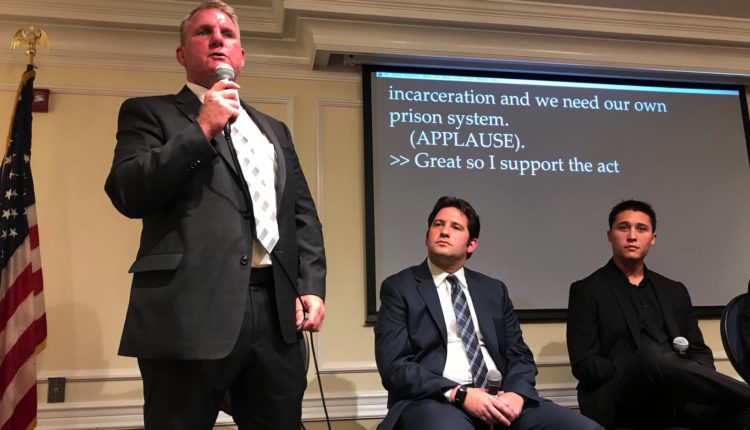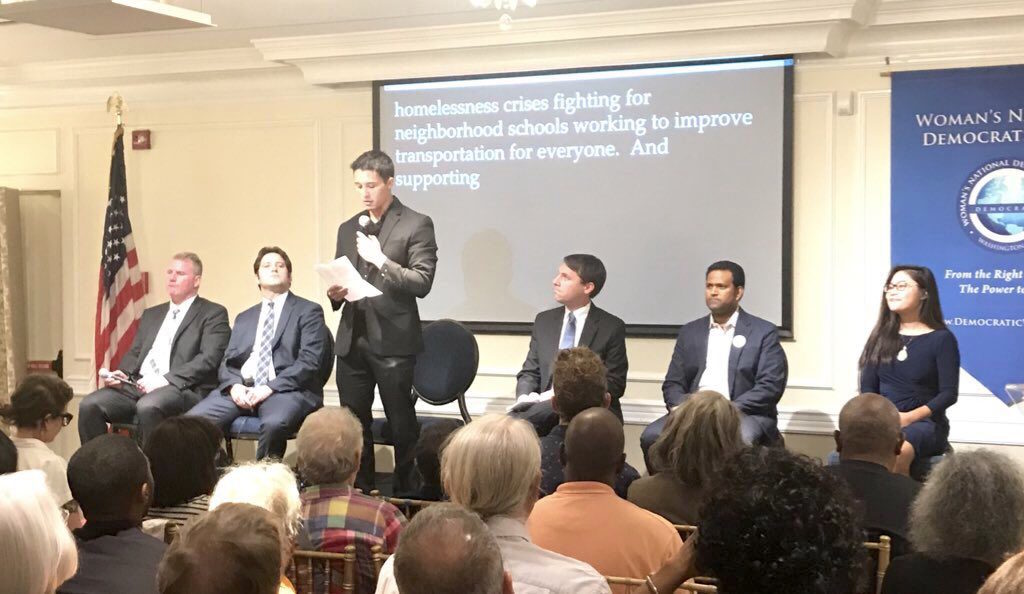
Democratic contenders for DC Council in Ward 2 got their first shot at breaking out in an increasingly crowded contest at a debate Thursday night. Six hopefuls were on the stage but much of the focus was on a potential candidate who wasn’t — embattled incumbent Jack Evans, who hasn’t decided whether to seek re-election.
The candidates began the night jockeying to distinguish themselves as the top change agent, in light of allegations dogging Evans that he used his status as the city’s longest-serving lawmaker for personal financial gain.
Three current advisory neighborhood commissioners — Patrick Kennedy, John Fanning and Kishan Putta — are seeking to replace Evans, alongside former Obama administration staffer Jordan Grossman, Marine Corps veteran Daniel Hernandez and health care worker Yilin Zhang. They’re building their platforms months in advance of the Democratic primary on June 2.
All of the candidates said they support restrictions on DC Council members’ financial income and investments from entities doing business with the city. Evans’ scandal in part stems from his support for a bill that would have substantially helped a digital sign company, which was paying Evans as a client of his private consulting business.
“There’s an appetite for change, and the appetite for a council member with integrity,” said Kennedy, vice chair of ANC 2A in the Foggy Bottom-West End neighborhood.

Evans, who has not been charged with a crime, is under separate investigations by both the federal government and DC Council. His colleagues reprimanded him earlier this year and proceeded to remove him as chair of the once-powerful Committee on Finance and Revenue. Critics are also collecting signatures to force a recall vote before the Democratic primary next June.
But Evans’ scandals did not wholly dominate the debate. Discussion mostly touched on hyperlocal matters, such as the dearth of affordable housing, an uptick in pedestrian and cyclist deaths, and barriers to expanding transit. Ward 2 stretches from downtown and Shaw in the east to Georgetown and Burleith in the west.
The three ANC members touted their work as elected public officials on projects varying from affordable housing deals to public transit improvements to facilities renovations.
“I was able to get 14th Street designated as a Main Street,” said Fanning, a longtime member of ANC 2F representing Logan Circle. The area received grant funding from the city to launch a Main Street group in 2018 to help the corridor’s small businesses.
Putta, who served in ANC 2B in Dupont Circle and currently is a member of ANC 2E representing Burleith, said he played a pivotal role in renovating Stead Park and advocating for bus lanes on 16th Street. More recently he has focused on improvements at Jelleff Recreation Center, including pushing for a reversal of preferred field access for Maret School in return for facility investments.
“This is what I’ve been doing for my constituents for a decade,” Putta told the crowd at the Woman’s National Democratic Club, at a debate co-hosted by several progressive groups and other organizations.
Hernandez, a Dupont Circle resident and Marine Corps veteran, said his working-class upbringing provides him a unique perspective.
“I’ve lost people to substance abuse, to gun violence, and suicide,” he said. “I deeply understand the challenges that many face trying to improve their lives.”
Housing affordability and development issues were a big topic of the night. DC Mayor Muriel Bowser has said the city needs 36,000 more units by 2025 — which Kennedy said he believes “might be undershooting [what] we’re going to need to produce with the population explosion we’ve seen in this city.”
“You can have very dense neighborhoods that don’t look like Manhattan,” said Kennedy, who said he supports building more units.
Hernandez said he supports abolishing single-family-home zones, an idea advanced by some who believe the zoning designation constrains supply.
Zhang — the newest entrant in the race — said that a “middle ground” can typically found in development disputes where neighbors of a project vehemently oppose the project. “Politics is really about compromise,” she said.
Zhang also emphasized support for more homes for those making 30% or less of the area median income, and said affordable housing also needs wraparound services, such as resources for single mothers and job opportunities.
“We’re getting close to a point where only people who are super wealthy are going to be able to stay here,” Grossman said on the issue of housing affordability.
Fanning and Kennedy cautioned against raising commercial property taxes to raise more revenue for city initiatives, arguing it would exacerbate the problem of vacant retail storefronts.
All of the candidates said they would support removing parking spaces to make way for more dedicated lanes for bicycles and buses.
On specific legislative issues, Grossman and Hernandez said they support fully funding the Birth-To-Three Act, meant to help low-income families cover the cost of child care. Zhang made a plug for ranked-choice voting, touted by some progressive activists as a way to avoid vote splitting.
“We need to consider racial equity with everything we do in District government,” said Grossman, noting a pending bill to create a racial equity tool for DC agencies.
Candidates were also questioned on whether they would bow out of the contest and support another contender to avoid splitting up the vote if Evans — first elected in 1991 — does end up running for another term.
“Another candidate and I have had that conversation,” Fanning said, adding he was open to the idea of exiting the race in that scenario. “And I’m hoping that they’ll drop out and support me.”
“Fat chance, John,” quipped Kennedy, who said he would “consider” quitting if it would mean removing Evans from office. Zhang and Hernandez also suggested they agreed.
“I don’t think we should be making backroom deals,” countered Grossman. Putta ducked on the question, saying he “can beat Jack Evans.”
Candidates were also lobbed an awkward question: What’s one thing Evans did that they would fight to retain?
“He did very well for himself,” Putta said, struggling to summon an answer, gaining applause. “He definitely benefited.” Putta also pointed to Evans’ role in overturning term limits for council members, as a 1994 ballot measure established. “The people of the city voted for term limits and the DC Council overturned the people’s will. And who led that charge? Council member Jack Evans,” he said.
Fanning praised Evans’ devotion to constituent services, which he vowed to continue. Grossman pointed to Evans’ support of the arts.
Kennedy said he would carry forward Evans’ work as “a consistent ally of the LGBTQ community.”
Moments later, in closing statements, candidates returned to nailing Evans.
“I think it’s time for a clean break from Jack Evans and his machine,” Grossman said.
The debate’s sponsors were largely a grouping of progressive organizations in the city. They included DC for Democracy, Jews United for Justice, Greater Greater Washington, the DC Working Families Party, United Food and Commercial Workers Local 400, SEIU 32BJ, the Gertrude Stein Democrats, the DC Democratic Women’s Club and the Washington Teachers’ Union.


Comments are closed.